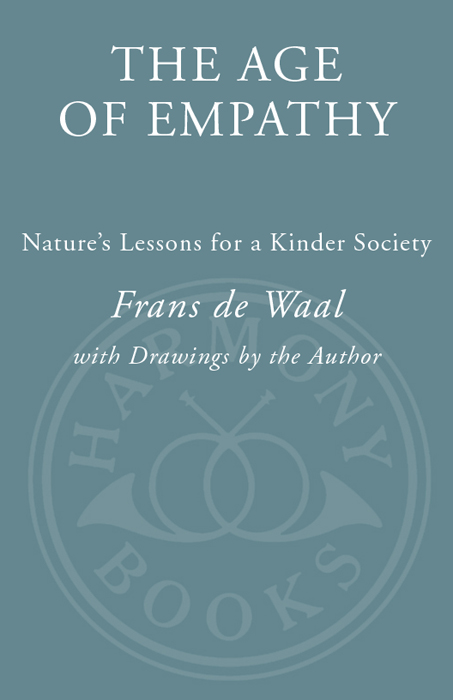
The Age of Empathy
Nature's Lessons for a Kinder Society
کتاب های مرتبط
- اطلاعات
- نقد و بررسی
- دیدگاه کاربران
نقد و بررسی

June 8, 2009
De Waal (Chimpanzee Politics
), a renowned primatologist, culls an astounding volume of research that deflates the human assumption that animals lack the characteristics often referred to as “humane.” He cites recent animal behavior studies that challenge the “primacy of human logic” and put animals on a closer behavioral footing with humans. Based on the studies of mammals, from primates to mice, de Waal proposes that empathy is an instinctual behavior exhibited by both lab rats and elephants. But de Waal's aim isn't merely to show that apes are transactional creatures with a basic understanding of reciprocity—but to reveal that the idea that humans are naturally calculating, competitive and violent is grounded in a falsehood willfully and selfishly perpetuated. Throughout the book, de Waal illustrates how behaving more like our wild mammalian cousins may just save humanity. His contention, colored by philosophical musings and fascinating anecdotes of observed emotional connections between animals, argues persuasively that humans are not greedy or belligerent because animals are; such traits are far from organic or inevitable but patently manmade.

July 15, 2009
What other primates can teach us about human nature.
Addressing the question of whether it is possible to"combine a thriving economy with a humane society," zoologist de Waal (Psychology/Emory Univ.; Our Inner Ape, 2005, etc.) answers with a resounding yes, turning the tables on economists like Milton Friedman, who justify cutthroat competition based on the notion of survival-of-the-fittest. The author also suggests that the central metaphor in Richard Dawkins's The Selfish Gene (1976) has been taken too literally. The contagion of phenomena such as laughter, yawning, stretching and stampedes in the face of danger are evidences of herd behavior that we share with other species. A new field of research,"embodied" cognition, explores how empathy emerges as we and other primates"involuntarily enter the bodies of those around us so that their movements and emotions echo within us as if they're our own." In 1992, researchers found a mechanism for this behavior, observing"mirror neutrons" firing in a monkey's brain whether they themselves were eating a peanut or watching an experimenter do so. While not denying the existence of aggression and competition in nature, de Waal provides many charming examples of how empathy—especially when it is coupled with the higher-order cognitive abilities of primates, whales, dolphins and humans, which all have the ability to"adopt another's point of view"—allows animals to show compassion across species boundaries. This social glue is evidenced in pets who act as companions, peacemaking primates who try to stop fights and offer comfort to the vanquished and mothers responding to their young. De Waal cites the"evolutionary antiquity" of empathy to argue that"society depends on a second invisible hand, one that reaches out to others."
An appealing celebration of our better nature.
(COPYRIGHT (2009) KIRKUS REVIEWS/NIELSEN BUSINESS MEDIA, INC. ALL RIGHTS RESERVED.)

August 15, 2009
De Waal (psychology, Emory Univ.; director, Living Links Ctr., Yerkes National Primate Research Ctr.) began his distinguished scientific career studying the brutal power struggles in chimpanzee societies ("Chimpanzee Politics", 1982) and then shifted focus to reconciliation and consolation behavior. Drawing upon his large body of research, plus that of others, de Waal examines what he calls the behavioral "glue" of primate societies: empathy, sympathy, a sense of fair play, and trust. In tracing the origins and evolution of empathy, de Waal points out that our ability to take another's perspective is an automatic impulse with a long evolutionary history in the mammalian line. Though the importance of empathy has traditionally been downplayed in scientific circles and the media, he argues that our kinder side should be considered as much a part of human (and chimpanzee and elephant) nature as aggression and competition. VERDICT This insightful work by an important primatologist who has changed not only how we view our closest relatives but how we view ourselves will appeal to a wide variety of general readers interested in the links between human evolution and animal behavior. For those who enjoyed Marc Bekoff's "Wild Justice" or de Waal's "Our Inner Ape".Cynthia Knight, Hunterdon Cty. Lib., Flemington, NJ
Copyright 2009 Library Journal, LLC Used with permission.

September 1, 2009
Ethological primatologist de Waal insists that H. sapiens isnt sui generis, which is why we stand to learn things about ourselves as a species from studying other animals behavior and development. For 30 years, he has worked to discover in apes and monkeys what are often considered specifically human qualities, such as kindness, moral discrimination, fairness, empathy, and sympathy. His illuminating description and explanation of his research have made progressively more magnetic reading (and viewing of the exceptionally illustrative photos and drawings) of eight previous books and dont fail him now. This time, however, he draws more than ever before on research on nonprimate species that indicates that the supposed human specifics mentioned above arent primate exclusives. Rather, they are, in differing degree, traits of species that live in groups or societies. It is high time, de Waal says, for economics and politics to take into account what ethological research demonstratesthat greed and aggression are complemented and usually overmastered by cooperation, justice, and peacemaking in social speciesand craft policy and law accordingly.(Reprinted with permission of Booklist, copyright 2009, American Library Association.)

























دیدگاه کاربران